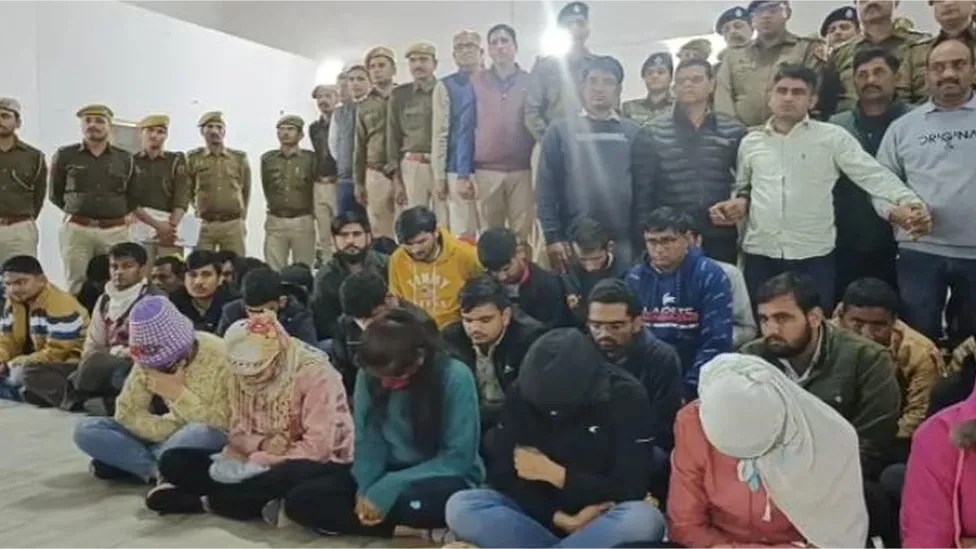India paper leaks: Cheating plagues India jobs coveted by millions
On a chilly December morning, police in the western state of Rajasthan saw a bus heading towards Udaipur city and followed it.

The night before, they had received a tip-off - the question paper for an examination to recruit teachers in the state's government schools was going to be leaked in the morning, just hours before millions of students were to take the test. Some 1,193 exam centres were set up for the eagerly-awaited recruitment drive on 24 December.
In India, where government jobs are highly coveted, cases of aspiring candidates resorting to unfair means are not uncommon. One way many job-seekers try to secure a place is by cheating in exams, which includes buying question papers or paying someone else to write the test on their behalf.
The bus in Udaipur was on its way to an examination centre and police suspected that those leaking the paper were on it.
At first, they waited at a distance as the bus circled around a building for a few minutes. Then they stopped it.
"Inside, we found four government school teachers who were solving question papers for at least 20 candidates," an official, who wished to stay anonymous, told the BBC.
The aspirants had allegedly paid the teachers, who were on invigilation duty at the centre, money - the police did not specify how much - to solve the papers for them. Around 20 "dummy" candidates, who were paid by aspirants to take the test on their behalf, were also caught from the bus. Police alleged the accused were carrying fake IDs.
A total of 48 people were arrested in connection with the scam that morning, prompting authorities to cancel the examination process.
Two of the main accused are yet to be caught - authorities have announced a bounty of $1,500 (£1,245) on each of them, Udaipur police chief Vikas Sharma told the BBC.
The incident was the latest in a series of scams where question papers for crucial government exams have been leaked or solved in exchange for money. Since 2018, at least 12 recruitment drives have been cancelled in the state after the test was leaked - just days, sometimes hours, before the exam.
Aspiring students say they are frustrated by the delays and are beginning to lose faith in the recruitment process.
"I don't think I will come again for the test," says Santosh Kumawat, the 30-year-old mother who has travelled twice from the neighbouring state of Maharashtra to appear for the exam in Rajasthan.
"First time, they called off the exam. The second time, our answer sheets were abruptly snatched away midway as the question paper had leaked," she said.
The problem is not unique to Rajasthan - exam leaks are notoriously common across India, where millions are unemployed and in search of secure jobs.
Political scientist Pankaj Kumar, who headed the Public Service Commission of Uttar Pradesh state that recruits civil servants, says "it's the craze for a government position which makes people desperate".
Government jobs in India are generally for life and Mr Kumar says millions often wait for years to get one and "spending money to cheat eventually becomes the motto of some aspirants".
In Gujarat, the home state of Prime Minister Narendra Modi, at least nine attempts to recruit schoolteachers and junior clerks have been cancelled since 2014 due to paper leaks. In the eastern state of West Bengal, authorities had to launch an investigation last year after question papers to hire teachers were widely shared on social media, hours before the exam.
The story is no different in the central state of Madhya Pradesh which was rocked by a massive recruitment scam in 2009 when aspirants taking a medical exam hired students from neighbouring states to write their papers. Question papers were also leaked and sold to candidates at astronomical prices, before authorities clamped down and arrested thousands.
The heartland states of Bihar and Uttar Pradesh are equally infamous.
In Bihar, students are sometimes not allowed to wear shoes and socks to exam centres to stop them from cheating. In the past, authorities have imposed fines, jail terms and even detained parents for allegedly helping their children cheat.
In neighbouring Uttar Pradesh, exams are often conducted under CCTV surveillance.
Police say lapses usually occur when question papers are being transported to examination centres. In other instances, like in Udaipur, students go to great lengths to fake their identity, making it almost impossible for authorities to catch them.
There are no clear laws to deal with the problem at the moment, as most cases are recorded as bailable offences such as fraud and cheating. Some states like Uttarakhand have passed a law to punish offenders with life imprisonment, but critics say this has done little to improve the situation.
Ashok Rathore, a senior official investigating paper leaks in Rajasthan, says authorities need to come up with new ways of policing to tackle the problem.
"We have asked the government to involve police and local administration even before the exam begins so that the question papers are beyond the reach of cheaters - just like ballot boxes are kept safe until the votes are counted," he said.
But experts say the problem also shines a spotlight on the unemployment crisis in India, where millions are unable to find jobs.
India's unemployment rate crept up to nearly 8% in December 2022, according to the Centre for Monitoring Indian Economy (CMIE), an independent think tank. It was less than 7% in 2021.
Almost 20 million people in India are employed by the federal and state governments, and officials estimate that at least a million more jobs are lying vacant at the moment.
"Even 30 years after liberalisation, India doesn't have enough jobs for its population, which is nearing 1.4 billion," says writer and political commentator Gurcharan Das.
He adds that government jobs are more lucrative in a country where three-quarters of its workforce is self employed with little to no social security benefits.
"Unlike government jobs, private jobs do not come with a lifelong guarantee of security and pensions," Mr Das said.
The job aspirants say their future looks bleak because of paper leaks and repeated cancellation of exams - they fear that they will soon be past the age limit to apply for these positions.
"I attended years of coaching classes to qualify for a government job, but most of my exams got cancelled," said Devender Sharma.
The 30-year-old from the Bikaner city in Rajasthan has been applying for a decade for a low-skilled government job in the state.
"My parents blame me for failing, even though it's the system which has let us down," he said.
-bbc







